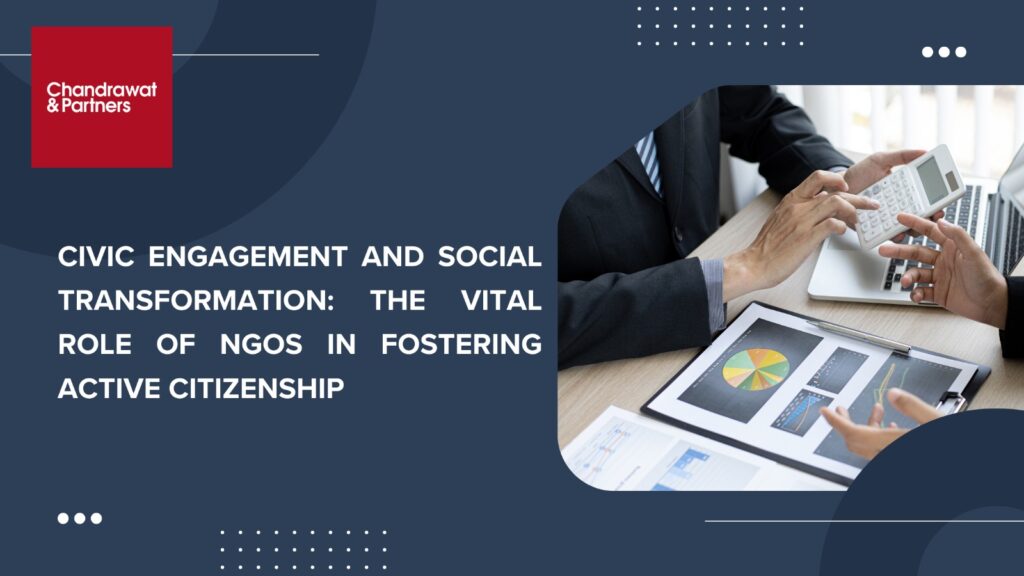Introduction
Civic engagement stands as a linchpin in the ongoing evolution of societies, cultivating inclusivity, and propelling positive social change. At the core of this transformative endeavor are Non-Governmental Organizations (“NGOs”), acting as instrumental catalysts for active citizenship. The symbiotic relationship between civic engagement, social transformation, and the indispensable contributions of NGOs is a dynamic force that drives collective action towards shared goals. NGOs serve as platforms that amplify the voices of citizens, channeling their concerns into actionable initiatives that address pressing social issues. By fostering dialogue, promoting education, and facilitating grassroots participation, NGOs empower individuals to contribute meaningfully to the betterment of their communities and the broader society. In turn, civic engagement nourishes the resilience and efficacy of NGOs, creating a harmonious cycle of collaboration that paves the way for a more just, equitable, and participatory future.
Defining Civic Engagement
Civic engagement refers to the collective involvement of individuals in their communities and society at large. It encompasses a spectrum of activities, from voting and volunteering to grassroots advocacy and community organizing. Active citizenship is the cornerstone of a vibrant democracy, empowering individuals to contribute to the decision-making processes that shape their lives.
The Role of NGOs
NGOs, as non-profit entities driven by a social mission, play a multifaceted role in promoting and sustaining civic engagement. They act as intermediaries between citizens and governmental bodies, channeling grassroots efforts into meaningful initiatives. NGOs often serve as the bridge connecting marginalized communities with resources, information, and opportunities for civic participation.
- Educating and Empowering Citizens
NGOs play a crucial role in educating citizens about their rights, responsibilities, and the mechanisms of civic participation. Workshops, seminars, and awareness campaigns organized by NGOs empower individuals with the knowledge needed to engage meaningfully in the democratic process.
2. Advocacy for Social Justice
Many NGOs focus on addressing systemic issues and advocating for social justice. By championing causes related to human rights, environmental sustainability, or economic equality, NGOs create platforms for citizens to rally around shared values and work collectively towards positive change.
3. Community Development Initiatives
NGOs often spearhead community development projects that directly impact the lives of citizens. Whether it’s improving access to education, healthcare, or infrastructure, these initiatives enhance the quality of life and foster a sense of shared responsibility among community members.
4. Facilitating Grassroots Movements
NGOs have been instrumental in supporting and amplifying grassroots movements. From civil rights to environmental activism, NGOs provide the organizational infrastructure, resources, and expertise needed to mobilize citizens effectively.
5. Monitoring and Accountability
NGOs serve as watchdogs, holding governments accountable for their actions. By monitoring policies, advocating for transparency, and exposing corruption, NGOs contribute to building trust between citizens and their institutions.
Challenges and Opportunities
Despite their significant impact, NGOs face challenges such as resource constraints, political pressures, and the need for sustained public interest. However, these challenges also present opportunities for innovation, collaboration, and increased civic resilience.
Conclusion
In the intricate dance of civic engagement and social transformation, NGOs emerge as key orchestrators, leveraging their expertise and passion to empower citizens and catalyze positive change. As we navigate the complexities of the modern world, recognizing and supporting the invaluable role of NGOs becomes imperative for building societies that reflect the collective aspirations of engaged and active citizens.
How we can help?
Legal Compliance and Governance:
Our team can assist NGOs in navigating complex legal frameworks to ensure compliance with local and international laws. This includes providing guidance on registration, tax compliance, and governance structures. By establishing a solid legal foundation, NGOs can operate effectively and maintain public trust.
Contractual Agreements and Partnerships:
NGOs often engage in collaborations and partnerships with governments, businesses, and other organizations. Our team can draft, review, and negotiate contractual agreements to safeguard the interests of NGOs. Ensuring clear terms, ethical considerations, and dispute resolution mechanisms are critical to fostering successful partnerships.
Intellectual Property Protection:
In an era where information and branding are crucial, our team can help NGOs protect their intellectual property rights. This includes trademark registration, copyright protection, and licensing agreements. Safeguarding these assets enhances the visibility and credibility of NGOs in the global arena.
Crisis Management and Risk Mitigation:
NGOs may encounter unforeseen legal challenges and crises. Our team can assist in developing crisis management plans, providing legal counsel during emergencies, and mitigating legal risks. This proactive approach ensures NGOs can navigate challenges effectively and maintain their mission-driven focus.
For more information or queries, please email us at
enquiries@chandrawatpartners.com





